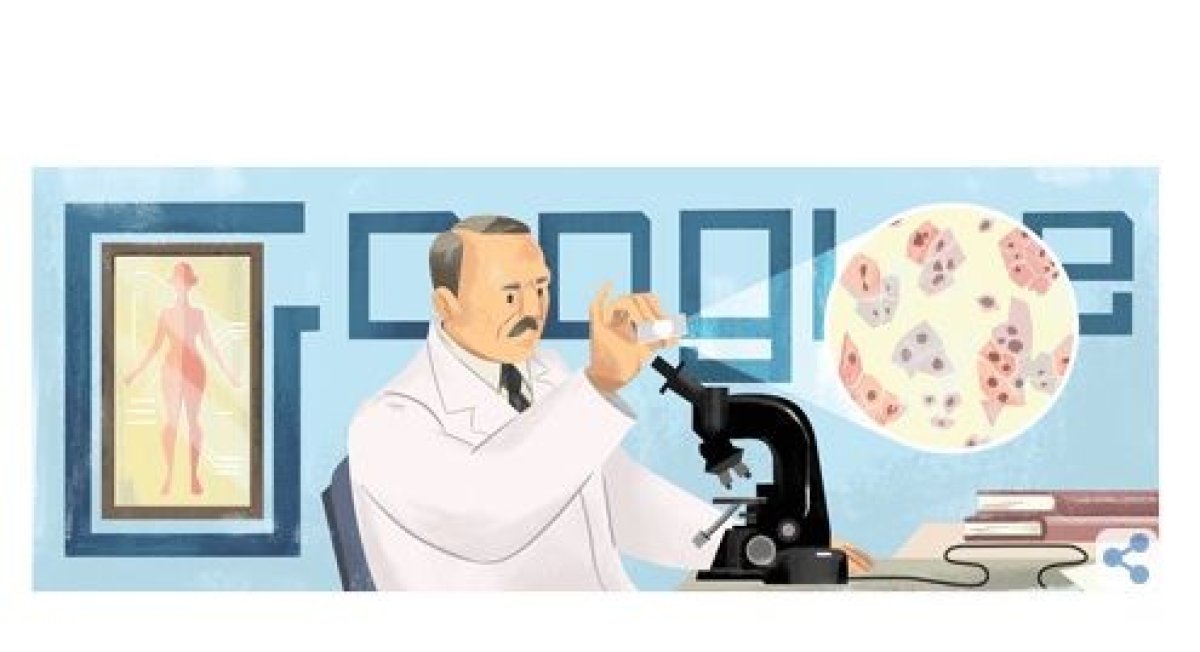Monday's Google Doodle is honoring the Greek medical pioneer Georgios Papanikolaou, who worked with his wife to develop the life-saving Pap smear.
Born in Kymi on the Greek island of Euboea on May 13, 1883, Papanikolaou is celebrated for inventing the test, which detects early signs of uterine and cervical cancer.
The son of a doctor, the cytopathologist originally studied music and humanities before deciding to go into medicine at the age of 15. He received his medical degree from the University of Athens in 1904 and a Ph.D. from the University of Munich six years later.
In 1911 he joined the Oceanographic Exploration Team of the Prince of Monaco before immigrating to the U.S. with his wife, Andromachi Mavroyenis, in 1913.
As Google notes in explaining Monday's Doodle, Papanikolaou originally struggled to get by in New York, working as a carpet salesman and playing the violin in restaurants, despite having both a medical degree and a doctorate. His wife's job sewing buttons brought in $5 a week.
Papanikolaou eventually got a job as a researcher in the pathology department at New York Hospital and the department of anatomy at Cornell University, with Mavroyenis working alongside him as a technician and sometimes a test subject.
The couple's breakthrough came after they asked a group of friends to participate in a study for their research looking at how cells in the vagina and uterus change during the menstrual cycle. A test involved undergoing a Pap smear.
As it happens, one of the couple's friends had cervical cancer at the time, which Papanikolaou was able to detect by seeing the malignant cells while examining the Pap smear under a microscope.
"The first observation of cancer cells in the smear of the uterine cervix was one of the most thrilling experiences of my scientific career," Papanikolaou said.
Despite first reporting that Pap smears are an effective way to detect cancer early in 1928, his findings were not widely recognized until they were published in Diagnosis of Uterine Cancer by the Vaginal Smear, his 1943 book.
The Pap smear is still widely used to this day and is estimated to have reduced fatalities caused by cancer of the reproductive systems in women by half because of early detection.
As a result of his work, Papanikolaou was twice nominated for the Nobel Prize and received the Albert Lasker Award for Clinical Medical Research in 1950. Other honors bestowed upon him included appearing on the Greek 10,000-drachma banknote before the currency was replaced by the euro, and appearing on a U.S. 13-cent stamp in 1978.
Papanikolaou died in Miami on February 19, 1962, at 78.

Uncommon Knowledge
Newsweek is committed to challenging conventional wisdom and finding connections in the search for common ground.
Newsweek is committed to challenging conventional wisdom and finding connections in the search for common ground.
About the writer
Ewan Palmer is a Newsweek News Reporter based in London, U.K. His focus is reporting on US politics, domestic policy ... Read more
To read how Newsweek uses AI as a newsroom tool, Click here.








